By Jim Davis - Florida Catholic
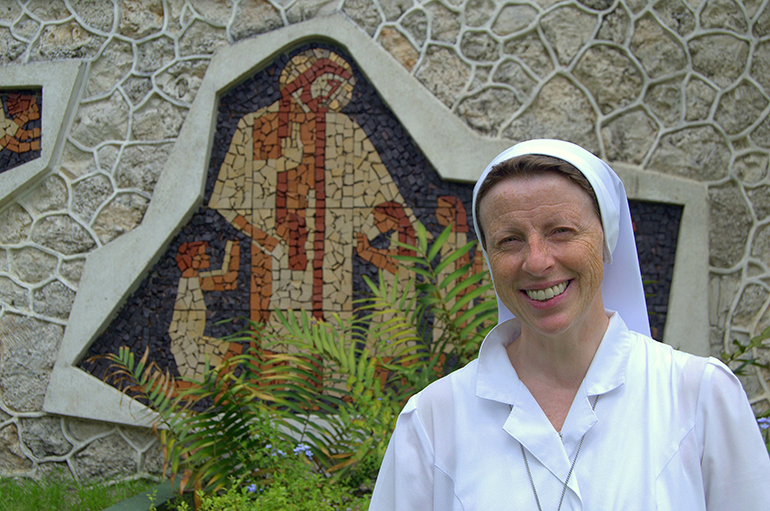
Photographer: JIM DAVIS | FC
Sister Lidia Valli, executive director of the Marian Center, pauses in front of a mosaic of Jesus and children.
MIAMI GARDENS | On the sprawling green campus of the Marian Center School, simpler is better. The teachers break down every concept into smaller lessons, then repeat them often. That's the best way when you're teaching children with Down syndrome and other intellectual limitations.
But when they grasp spiritual concepts like the consecrated host, they show it, Sister Lidia Valli said.
"You can see they're aware that it's something special, that it's Jesus," said the executive director of the school. "Even when they hold it in their hand, they do it with reverence."
Founded in 1963 by her order, the Sisters of St. Joseph Benedict Cottolengo, the Marian Center School has 41 children from kindergarten through high school age. They're taught a full range of subjects, including math, reading, science, social studies, and of course religion.
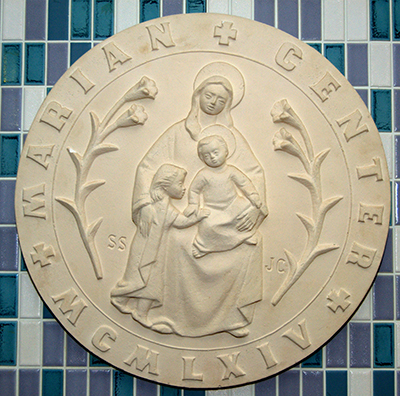
Photographer: JIM DAVIS | FC
Logo of the Marian Center shows Mary embracing the baby Jesus on her lap, along with a child standing beside her, who represents all the children the center cares for. The logo was adapted from an artwork, "La Madonna del Silenzio," that the center's founder, the late Sister Lucia Ceccotti, brought from Italy in 1963.
The children are served by four sisters, plus lay teachers and maintenance staff. Other programs include an Adult Day Training Program and a group home for women with development disabilities. Currently seven women live at the home, along with one of the sisters.
The Adult Day Training Program is a godsend for Chris Abreu, a young man with Down syndrome who lives in Miami Lakes. He enjoys the full range of activities there, including swimming, movies and basketball, said his mother, Carmen Abreu.
"He tells me all about what happened," she said. "It's good that he's with others to keep him company, instead of just being home with me. The sisters do a good job with all the kids."
Father Curtis Kiddy, pastor of St. Jerome Church, Fort Lauderdale, celebrates Mass for the children, with occasional help from Father Chris Marino, rector of St. Mary Cathedral in Miami, and Father Kenneth Whittaker, pastor of Our Lady of Mercy Church, Deerfield Beach.
Only half of the students at the Marian Center school, though, are Catholic. The others are mostly Protestant or from nondenominational churches.
"But we don’t divide them by religion — we all celebrate together," Sister Lidia said. "There's only one God."
Patient, vulnerable
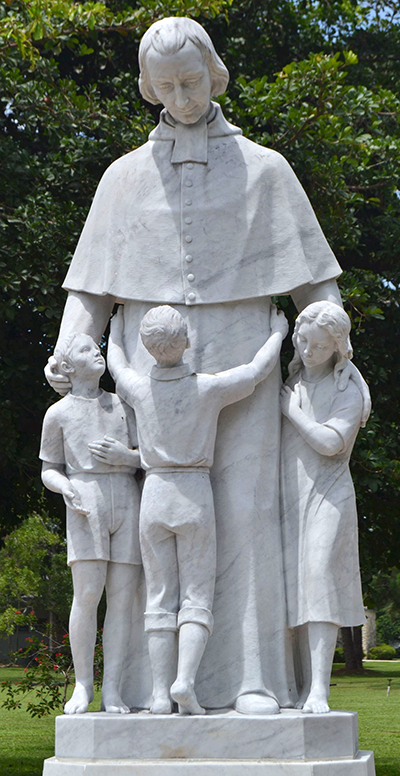
Photographer: JIM DAVIS | FC
Statue of the 19th century St. Joseph Benedict Cottolengo stands in the 50-acre campus of the Marian Center.
The Miami Gardens school was the first work outside Italy by the Sisters of St. Joseph Benedict Cottolengo. The Turin-based religious order carries on the 19th century saint’s outreach to the needy, including those with mental as well as physical needs.
The sisters were invited to South Florida in January 1963 by then Bishop Coleman F. Carroll, who had heard of their specialty in serving people with developmental disabilities. Eleven women answered the call, led by Sister Lucia Ceccotti, general secretary of the order, who died just a month before the school's 50th anniversary in 2013.
Much of their approach springs from an understanding of Down syndrome children, Sister Lidia said: simple, welcoming, vulnerable, affectionate. She said they often warn each other of a step up or down, or hold a door open for someone in a wheelchair.
"They're very patient with each other — even more than with us," Sister Lidia said with a smile.
A big difference is their sense of time, she said: "simple, direct, in the moment." So repetition of lessons over several days is essential.
But she disagrees with people who worry over how much the children can understand about the Eucharist.
"How much do we (adults) understand?" she asked. "We believe. Yes, we have to make it simpler for our children. We use repetition and break it down step by step."
For the concept of transubstantiation, for instance, the teachers say simply that the consecrated host is Jesus. "A sandwich has bread. The food that you eat with a meal is bread," Sister Lidia said. "When a priest prays over it, it is no longer bread. It's Jesus."
And yes, her students show understanding, she said, mentioning a 13-year-old in particular. "She can't even speak, but when a priest gives her Holy Communion, she gives a big smile — a smile that she doesn't make for anything else."
Depending on providence
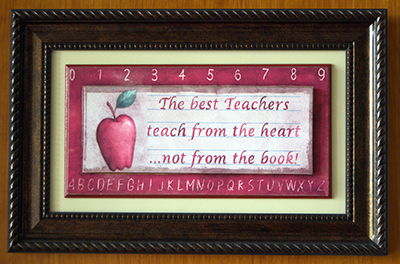
Photographer: JIM DAVIS | FC
Motto outside the office of Sister Lidia Valli, executive director of the Marian Center.
While caring for the children, however, the Marian Center has suffered its own problems. The 50-acre center is still recovering from a financial crisis in 2010, when it faced the threat of closure. Rescue came when the sisters took over administration from laypeople, but several programs were cut: preschool, the summer program, and speech, physical and occupational therapy.
But the Marian Center isn’t forgotten. It benefits from five volunteers year round. Its Parent-Teacher Association refurbished the basketball courts in April. The Greater Miami Adventist Academy holds an annual Field Day for the children, with activities like face painting and gymnastics. And every December, the center gets Christmas gifts from two parishes: Our Lady of the Lakes, Miami Lakes, and Our Lady of Mercy.
"We trust in divine providence," Sister Lidia said. "And providence can be practical."
Asked what she would like everyone to know about her young charges, she answered simply: not to see them as disabled people, but merely as people with limitations. The difference is crucial to their work, Sister Lidia said.
"We don’t let their limitations define them as persons," she said. "And a limitation can be helped."
This is part of a package of stories on Church outreach to the disabled that appeared in the July 2016 edition of the Florida Catholic. See related stories:
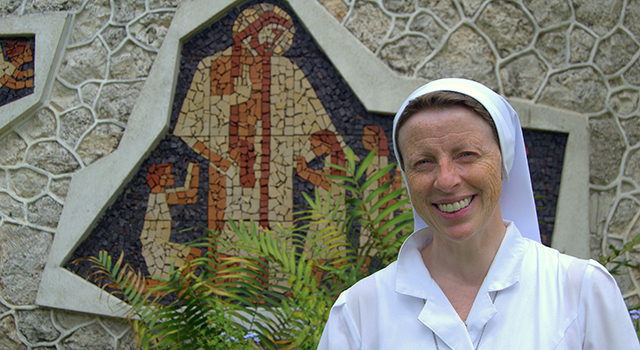

Comments from readers